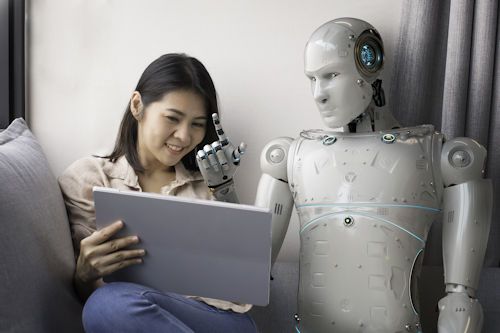Telescopes have captured the rare light flash from a dying star as it was ripped apart by a supermassive black hole.



Are we in a simulation?
In an influential 2003 paper, University of Oxford philosopher Nick Bostrom laid out the possibility that our reality is a computer simulation dreamed up by a highly advanced civilization. In the paper, he argued that at least one of three propositions must be true:

I am for Ethical Robots what about you?
Every time we talk to Alexa, Siri, Google, or Cortana, we are building the brains of the robot. Human machine relationships increase and robot ethics are needed for the coming age of automation, they are simply not adequate for the nuanced capabilities and behaviors we are beginning to see in today’s devices.


The world’s small-scale farmers now can see a path to solving global hunger over the next decade, with solutions—such as adopting climate-resilient crops through improving extension services—all culled rapidly via artificial intelligence from more than 500,000 scientific research articles.
The results are synthesized in 10 new research papers—authored by 77 scientists, researchers and librarians in 23 countries—as part of Ceres2030: Sustainable Solutions to End Hunger. The project is headquartered at Cornell University, with partners from the International Food Policy Research Institute (IFPRI) and the International Institute for Sustainable Development (IISD).
The papers were published concurrently on Oct. 12 in four journals— Nature Plants, Nature Sustainability, Nature Machine Intelligence and Nature Food —and assembled in a comprehensive package online: Sustainable Solutions to End Hunger.




Circa 1994
It is generally accepted that structure formed in the matter dominated Universe, for obvious reasons. In this paper, we would like to suggest an alternate theory: that structure could have formed in the radiation dominated Universe if it was “protected” from destruction. This protection is envisioned as a “crystal”, of sorts, made up of primordial black holes (PBH’s), which form a cavitation into which any matter particles in the nucleosynthesis period of the Universe (around 100 seconds after the Big Bang) could have taken refuge. A sort of oasis in a sea of radiation. Such a scenario could solve several problems in cosmology, namely: how matter got a foot-hold over anti-matter in the Universe; the structure/galaxy formation problem; and possibly suggest ideas on the gamma-ray count and distribution.

The Higgs mode associated with the amplitude fluctuation of an order parameter can decay into other low-energy bosonic modes, which renders the Higgs mode usually unstable in condensed matter systems. Here, the authors propose a mechanism to stabilize the Higgs mode in anisotropic quantum magnets. They show that magnetic anisotropy gaps out the Goldstone magnon mode and stabilizes the Higgs mode near a quantum critical point. The results are supported by three independent approaches: a bond-operator method, field theory, and quantum Monte Carlo simulation with analytic continuation.